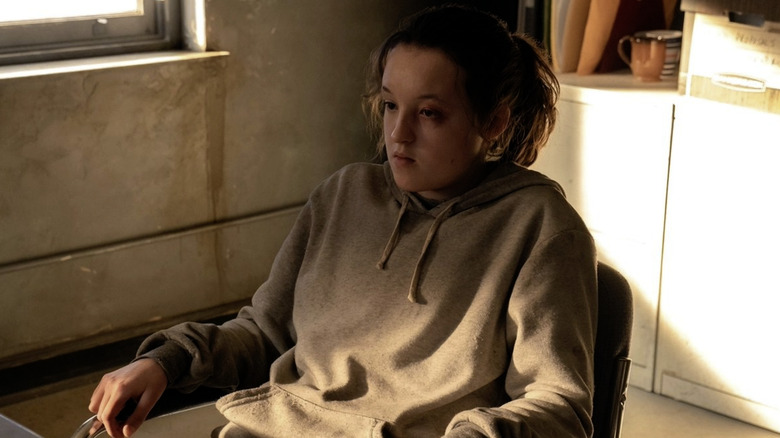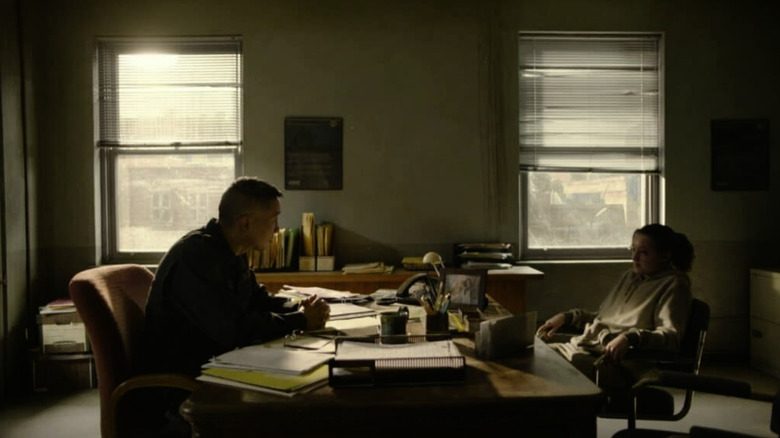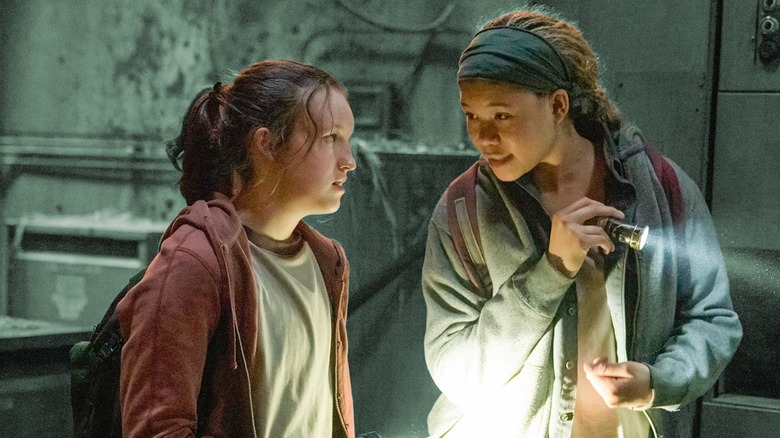The Last Of Us Episode 7 Adds An Ellie In FEDRA School Scene That Wasn't In The Game
This article contains spoilers for "The Last of Us" episode 7.
Echoing the original video game, episode 7 of "The Last of Us" sets the tone of the Winter chapter by shifting the main perspective from our rugged protector Joel (Pedro Pascal) to his plucky, young companion, Ellie (Bella Ramsey). In the aftermath of Joel's injury at the university, Ellie frantically searches for medical supplies as Joel bleeds out. He's still alive, but unless they can take care of his stab wound, his time is limited. For the first time, the roles between these characters are fully reversed. While Joel is incapacitated, he advises Ellie to turn back to Jackson without him and get help, but ultimately, it's up to Ellie to decide what's best for the two.
Based on the DLC chapter of the same name, "Left Behind," this episode serves as an interlude to show us Ellie's current state of mind in a moment of peril. We flashback to her days living in the FEDRA boarding school in the Boston Quarantine Zone, jogging while listening to a Pearl Jam song on her walkman. A fight ensues when an older kid, Bethany (Ruby Lybbert), forcefully takes the headphones off of Ellie's head — leaving Bethany with "15 stitches" in the infirmary and Ellie in Captain Kwong's (Terry Chen) office.
"The Last of Us" series often finds the most success when it's diverging from the game in elegant ways, and this particular scene depicting a slice of life in the FEDRA boarding school adds a surprising amount of depth. Though she isn't any less brash, this scene presents an even younger, more naive version of Ellie and a semi-parental figure trying to justify his place within a fascist system.
Become a FEDRA drone, or die
For most of the story so far, FEDRA has mostly gone faceless compared to the resistance groups that have fought against their control. We've been introduced to Marlene (Merle Dandridge) as a fierce and capable leader, and also seen the more unstable side of Kathleen (Melanie Lynskey).
Ironically, Captain Kwong is depicted as gentle and with good intentions. He calls Ellie to his office to give her a warning and a choice: if she fixes her act, perhaps she can one day end up as a Captain like him. That means having access to her own room and a bed, not going on patrol, and not being bossed around as a soldier by the "Bethanys" of the world until she winds up dead. Despite her attitude, Kwong genuinely wants the best for Ellie. Kwong says to her, "We're the only thing holding this all together."
From Ellie's perspective as an orphaned teenager who has only ever seen life in the QZ, Kwong does make a certain amount of sense; under an oppressive power structure, it's hard for anyone, let alone a child, to consider a better way of life for themselves as an option. Throughout the first act of this episode, Ellie drinks the figurative FEDRA Kool-Aid.
After four weeks of radio silence, Ellie's best friend Riley (Storm Reid) sneaks into the dorms and decides to take Ellie on a late-night adventure. Riley reveals that she has run off to join the Fireflies — something Ellie seems to really oppose. "Like, in a way, FEDRA kinda holds everything together," Ellie justifies to Riley, echoing Captain Kwong's sentiments. In a subtle, poignant moment, "The Last of Us" depicts how fascism thrives: through the influence of growing minds like Ellie, and the passivity of men like Kwong.
Riley challenges Ellie's FEDRA conditioning
As we spend more time with Riley and get to know her on her own terms, the flaws with life under FEDRA control become much more obvious. Ellie asks why Riley can't stay and try to change the system from the inside, but while Ellie might be primed to become a Captain one day, for Riley, it's not so simple. Despite all of her strong beliefs and morals, Riley's duties that were assigned to her were degrading and below her abilities. How can you change the system from the inside, when Riley, a Black woman, is being substantially targeted by that exact system?
"Left Behind" is a coming-of-age story, a tragic romance, and an origin story for the character of Ellie. Through the new scene in the FEDRA boarding schools and the addition of a philosophical divide between Ellie and Riley, the HBO adaptation adds another political layer to the text. We get to see how a child like Ellie, who has only ever known a post-apocalyptic world under a fascist system, could become numb to her own oppression and make an individualistic justification for her own survival.
As we watch her relationship with Riley unfold, we then get to see Ellie slowly begin to accept that the real world is much more complicated than black-and-white morality. In the end, showrunners Craig Mazin and Neil Druckmann took the subtextual themes of the story and brought them to the forefront of "Left Behind," and impressively, managed to do so through a few additional scenes.


